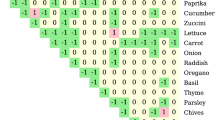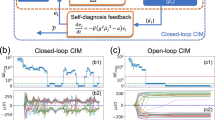Abstract
In this work, we present the benchmark generator PUBO\(_i\), Polynomial Unconstrained Binary Optimization, that combines subproblems to create instances of pseudo-boolean optimization problems. Any mono-objective pseudoboolean functions including existing classical optimization problems can be expressed with Walsh functions. The benchmark generator can tune main features of problems such as problem dimension, non-linearity degree, and neutrality. Additionally, to be able to create instances with properties similar to those of real-like combinatorial optimization problems, the goal of PUBO\(_i\) is to introduce the notion of variable importance. Indeed, the importance of decision variables can be tuned using three benchmark parameters. In the version presented here, we consider four subproblems already used in Chook generator for benchmarking quantum computers and algorithms as a basis. We also present the impact of benchmark parameters using a fitness landscape analysis that empirically shows these parameters to significantly impact the variable importance.
Access this chapter
Tax calculation will be finalised at checkout
Purchases are for personal use only
Similar content being viewed by others
Notes
- 1.
Indeed, j pairs of symmetric local minima.
References
Bartz-Beielstein, T., et al.: Benchmarking in optimization: Best practice and open issues. arXiv preprint arXiv:2007.03488 (2020)
Burkard, R.E., Karisch, S.E., Rendl, F.: QAPLIB-a quadratic assignment problem library. J. Global Optim. 10(4), 391–403 (1997)
Carnell, R.: LHS: Latin hypercube samples, R package version 0.16 (2018)
Date, P., Patton, R., Schuman, C., Potok, T.: Efficiently embedding QUBO problems on adiabatic quantum computers. Quantum Inf. Process. 18(4), 1–31 (2019). https://doi.org/10.1007/s11128-019-2236-3
Doerr, C., Ye, F., Horesh, N., Wang, H., Shir, O.M., Bäck, T.: Benchmarking discrete optimization heuristics with IOH profiler. Appl. Soft Comput. 88, 106207 (2020)
Galluccio, A., Loebl, M., Vondrák, J.: Optimization via enumeration: a new algorithm for the max cut problem. Math. Program. 90(2), 273–290 (2001)
Glover, F., Hao, J.K., Kochenberger, G.: Polynomial unconstrained binary optimisation-part 1. Int. J. Metaheuristics 1(3), 232–256 (2011)
Hamze, F., Jacob, D.C., Ochoa, A.J., Perera, D., Wang, W., Katzgraber, H.G.: From near to eternity: spin-glass planting, tiling puzzles, and constraint-satisfaction problems. Phys. Rev. E 97(4), 043303 (2018)
Hansen, N., Auger, A., Ros, R., Finck, S., Pošík, P.: Comparing results of 31 algorithms from the black-box optimization benchmarking BBOB-2009. In: GECCO, pp. 1689–1696 (2010)
Hansen, N., Auger, A., Ros, R., Mersmann, O., Tušar, T., Brockhoff, D.: COCO: A platform for comparing continuous optimizers in a black-box setting. Optim. Methods Softw. 36(1), 114–144 (2021)
Johnson, D.S., Trick, M.A.: Cliques, coloring, and satisfiability: second DIMACS implementation challenge, 11–13 October, 1993, vol. 26. Am. Math. Soc. (1996)
Leprêtre, F., et al.: Fitness landscapes analysis and adaptive algorithms design for traffic lights optimization on SIALAC benchmark. Appl. Soft Comput. 85, 105869 (2019)
Lü, Z., Glover, F., Hao, J.K.: A hybrid metaheuristic approach to solving the UBQP problem. Eur. J. Oper. Res. 207(3), 1254–1262 (2010)
Malan, K.M., Engelbrecht, A.P.: A survey of techniques for characterising fitness landscapes and some possible ways forward. Inf. Sci. 241, 148–163 (2013)
Malan, K.M.: A survey of advances in landscape analysis for optimisation. Algorithms 14(2), 40 (2021)
Perera, D., et al.: Chook-a comprehensive suite for generating binary optimization problems with planted solutions. arXiv preprint arXiv:2005.14344 (2020)
Sagawa, M., et al.: Learning variable importance to guide recombination. In: 2016 IEEE SSCI, pp. 1–7 (2016)
Sagawa, M., et al.: Learning variable importance to guide recombination on many-objective optimization. In: 6th IIAI-AAI, pp. 874–879. IEEE (2017)
Schuster, P., Fontana, W., Stadler, P.F., Hofacker, I.L.: From sequences to shapes and back: a case study in RNA secondary structures. Proc. R. Soc. London. Ser. B. Biol. Sci. 255(1344), 279–284 (1994)
Taillard, E.: Benchmarks for basic scheduling problems. Eur. J. Oper. Res. 64(2), 278–285 (1993)
Tari, S., Basseur, M., Goëffon, A.: Sampled walk and binary fitness landscapes exploration. In: Lutton, E., Legrand, P., Parrend, P., Monmarché, N., Schoenauer, M. (eds.) EA 2017. LNCS, vol. 10764, pp. 47–57. Springer, Cham (2018). https://doi.org/10.1007/978-3-319-78133-4_4
Tušar, T., Brockhoff, D., Hansen, N.: Mixed-integer benchmark problems for single-and bi-objective optimization. In: Proceedings of the Genetic and Evolutionary Computation Conference, pp. 718–726 (2019)
Tušar, T., Brockhoff, D., Hansen, N., Auger, A.: COCO: the bi-objective black box optimization benchmarking (bbob-biobj) test suite. ArXiv e-prints (2016)
Verel, S., Derbel, B., Liefooghe, A., Aguirre, H., Tanaka, K.: A surrogate model based on Walsh decomposition for pseudo-Boolean functions. In: Auger, A., Fonseca, C.M., Lourenço, N., Machado, P., Paquete, L., Whitley, D. (eds.) PPSN 2018. LNCS, vol. 11102, pp. 181–193. Springer, Cham (2018). https://doi.org/10.1007/978-3-319-99259-4_15
Walsh, J.L.: A closed set of normal orthogonal functions. Am. J. Math. 45(1), 5 (1923)
Weinberger, E.: Correlated and uncorrelated fitness landscapes and how to tell the difference. Biol. Cybern. 63(5), 325–336 (1990)
Wood, S.: MGCV: GAMs in R. Generalized Additive Mixed Models Using MGCV and LME4 (2012)
Wright, S.: The roles of mutation, inbreeding, crossbreeding, and selection in evolution. In: Proceedings of the Sixth International Congress of Genetics, vol. 1, pp. 356–366 (1932)
Zuur, A.F., Ieno, E.N., Walker, N.J., Saveliev, A.A., Smith, G.M.: Things are not always linear; additive modelling. In: Mixed effects models and extensions in ecology with R. SBH, pp. 35–69. Springer, New York (2009). https://doi.org/10.1007/978-0-387-87458-6_3
Acknowledgements
Experiments presented in this paper were carried out using the CALCULCO computing platform, supported by SCoSI/ULCO (Service COmmun du Système d’Information de l’Université du Littoral Côte d’Opale).
Author information
Authors and Affiliations
Corresponding author
Editor information
Editors and Affiliations
Rights and permissions
Copyright information
© 2022 The Author(s), under exclusive license to Springer Nature Switzerland AG
About this paper
Cite this paper
Tari, S., Verel, S., Omidvar, M. (2022). PUBO\(_i\): A Tunable Benchmark with Variable Importance. In: Pérez Cáceres, L., Verel, S. (eds) Evolutionary Computation in Combinatorial Optimization. EvoCOP 2022. Lecture Notes in Computer Science, vol 13222. Springer, Cham. https://doi.org/10.1007/978-3-031-04148-8_12
Download citation
DOI: https://doi.org/10.1007/978-3-031-04148-8_12
Published:
Publisher Name: Springer, Cham
Print ISBN: 978-3-031-04147-1
Online ISBN: 978-3-031-04148-8
eBook Packages: Computer ScienceComputer Science (R0)




